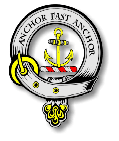 |
Gray Family Name History |
 |
Though shrouded by the mists of time, the chronicles of Scotland reveal the early records of the Norman surname Gray which ranks as one of the oldest. The history of the name is interwoven within the colourful plaid of Scottish history and is an intrinsic part of the heritage of Scotland.
Diligent analysis by professional researchers using such ancient manuscripts as the Domesday Book (compiled in 1086 by William the Conqueror), the Ragman Rolls, the Wace poem, the Honour Roll of the Battel Abbey, the Inquisitio, the Curia Regis, Pipe Rolls, the Falaise Roll tax records, baptismals, family genealogies, and local parish and church records shows the first record of the name Gray was found in Northumberland where they were seated from very early times and were granted lands by Duke William of Normandy, their liege Lord, for their distinguished assistance at the Battle of Hastings in 1066 A.D.
Variable spellings of the name were typically linked to a common root, usually one of the Norman nobles at the Battle of Hastings. Gray occurred in many references from time to time, and variables included were Grey, Groy, Croy, Graye, and many more. Scribes recorded and spelled the name as it sounded. It was not unlikely that a person would be born with one spelling, married with another, and buried with a headstone which showed another. Preferences for different spellings were derived from a branch preference, to indicate a religious adherence or sometimes to show nationalistic allegiance.

The family name Gray is believed to be descended originally from the Norman race. The Normans were commonly believed to be of French origin but were, more accurately, of Viking origin. The Vikings landed in the Orkneys and Northern Scotland about the year 870 A.D., under their King, Stirgud the Stout. Later, under their Jarl, Thorfinn Rollo, they invaded France about 910 A.D. The French King, Charles the Simple, after Rollo laid siege to Paris, finally conceded defeat and granted northern France to Rollo. Rollo became the first Duke of Normandy. Duke William, who invaded and defeated England in 1066, was descended from the first Duke Rollo of Normandy.
After the Conquest, Duke William took a census of most of England in 1086, which became known as the Domesday Book. By 1070, William's nobles were growing restive, dissatisfied with their grants of land. William took an army north, and laid waste most of the northern counties. King Malcolm Canmore of Scotland offered refuge to these nobles, granting them land. Later, King David, about 1160, also encouraged his Norman friends to come north to join the royal court and obtain lands.
The surname Gray emerged as a notable Scottish family name in the county of Northumberland where they were recorded as a family of great antiquity seated with manor and estates in that shire. Anschatel Groy settled in Chillingham in Northumberland after accompanying William the Conqueror in 1066. He was from the department of Haute Saone called Gray, sometimes Groy, or Croy, in Normandy. From this house sprang the Grays of Suffolk, Kent, Tankerville, and Stamford. In 1248 the Chillingham branch moved north when Hugh Gray settled in Berwickshire, and John Gray became the Mayor of Berwick in 1250. Henry Gray rendered homage to King Edward I of England on his brief conquest of Scotland in 1296. Sir Thomas Gray of Lanarkshire was an important historian of early border life. The Grays became more prominent in Scottish life and became a fully fledged Scottish Clan of great dignity. Of note amongst the family at this time was Sir Thomas Gray of Lanarkshire.

The surname Gray contributed much to local politics and in the affairs of England or Scotland. Later, in the 16th, 17th, and 18th centuries the country was ravaged by religious and political conflict. The Monarchy, the Church and Parliament fought for supremacy. The unrest caused many to think of distant lands. The news about the attractions of the New World spread like wildfire. Many sailed aboard the fleet of sailings ships known as the "White Sails."
In North America, migrants which could be considered kinsmen of the surname Gray, or variable spellings of that same family name included Francis Gray who settled in Virginia in 1635 with his wife Alice; Robert Gray settled in the Barbados in 1680 with his wife and servants; David, Edward, Henry, James, John, Joseph, Martha, Patrick, Richard, Samuel, Thomas and William Gray, all settled in Philadelphia between 1840 and 1860; Daniel Grey settled in Virginia in 1654, along with Samuell, Thomas, Miles, and John; John Graye settled in Virginia in 1673.
The family name was noted in the social stream. There were many notables of this name: Admiral Gordon Gray; Sir James Gray, Air Marshall Gray; Admiral Sir John Gray; Sir William Gray; George Gray signed the draft Constitution of the United States in 1787.
